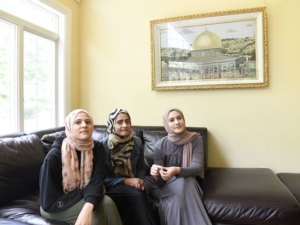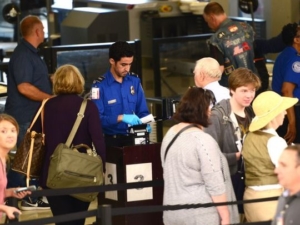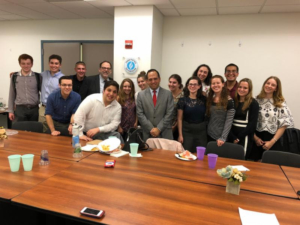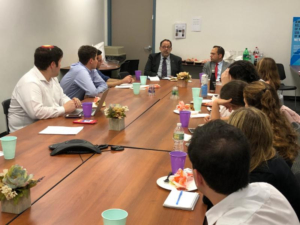14 New Jersey women alleging anti-Muslim bias at Newark Airport security
‘We felt like caged animals.” Sisters Yasmine, Suzanne, and Sarah Elfarra talk about their experience of being grouped with other Muslim women and searched based on their hijabs. Danielle Parhizkaran, Photo Journalist, @DanielleParhiz
Fourteen women were pulled off a security line at Newark Liberty International Airport one morning last December as they waited to board a flight to Chicago. Security agents, they said, pored through their luggage and cupped their hands around their legs, torso and breasts, while from behind a clear window other travelers laughed and snapped pictures with their phones.
The women said they felt like animals in a zoo. After two hours of searches, they missed their flight.
Many of the women had never met before that day, but they had one thing in common: They were identifiable as Muslims because they wear a hijab, or Islamic head scarf. Now, they have joined together to file a complaint against the Transportation Security Administration, the federal agency that oversees airport security, claiming they were profiled because of their religion.
“I don’t even want to remember that day,” said Meriem Bendaoud of Bayonne, who was traveling with her 19-year-old twin daughters, Sara and Amina. “It was horrible. It took us two hours in front of everybody. It was disgusting. We were cornered, all of us.”
The women, all of whom live in New Jersey, were bound for an annual conference of the Islamic Circle of North America, one of the country’s oldest and largest Muslim organizations. They boarded a later flight and missed a half-day of the three-day event.
“This is systematic racism,” Yasmine Elfarra, left, recalls telling the TSA agents who she said singled her out along with her sisters and 11 other women who were wearing hijabs, forcing them to miss a flight to Chicago. “You lumped us in the group because we look like one another.” (Photo: Danielle Parhizkaran/Northjersey)
The Council on American-Islamic Relations, or CAIR, of New Jersey, which is representing the women, said the agents’ actions were illegal under federal anti-discrimination laws. The letter of complaint was filed May 2 with the TSA and the Department of Homeland Security, which oversees it, asking for $100,000 in damages for each of the women, an official apology and mandatory diversity training for all TSA agents working at Newark Airport.
The incident is one of a growing number of bias cases involving federal agencies, according to CAIR, which released a report in April claiming that allegations of anti-Muslim bias rose 17 percent last year. Nationwide, 2,599 such incidents were reported to CAIR; federal agencies instigated 35 percent of those incidents, the report stated.
In a statement, a TSA spokeswoman, Lisa Farbstein, said the agency’s policies and practices have to comply with civil rights laws and “must not discriminate against travelers on the basis of race, color, national origin, sex, relation, age, disability, genetic information, sexual orientation and parental status.”
She referred questions about the complaint to the Department of Homeland Security’s Office of Civil Rights and Civil Liberties. A spokeswoman for the department said the agency “as a matter of policy, cannot comment on open complaints.”
‘Why are you bringing all these people?’
Bendaoud’s voice shook as she recalled what happened the morning of Dec. 28. About 6 a.m., she was waiting in line to clear a security checkpoint, she said, when an agent asked passengers who were booked on a 7:10 flight to Chicago to move to the front of the line. The 14 women moved up, but Bendaoud thought it was odd that a family headed for the same flight was told to remain in place.
Then agents brought out a security dog to sniff her bag. They said the dog smelled something that needed further scrutiny, so she and her daughters stepped aside for extra screening. Then, she saw agents pulling aside other women who were also wearing hijabs.
“I said, ‘If you want to do extra search of me and my daughters, that’s fine, but why are you bringing all these people?’” she said.
Bendaoud said the agents told her they were being searched because they were part of the same group, even as she and the other women insisted that they did not know one another and had booked their travel separately.
She said she was patted down over her clothes around her breasts and between her legs, within view of other travelers. Agents, she said, looked at every item in her carry-on bag, and swabbed her shoes, phone and laptop for chemicals.
Bendaoud, a professor of biology at New Jersey City University, she said she understands the need for security and secondary screenings. But she grew upset when she saw the others, all of them young women between the ages of 16 and 22, getting the same treatment.
“When they did it to other girls, I thought it was a violation,” she said. “At least I had my girls with me. I could talk to them. They didn’t have their parents. One was a minor. Some of them started crying. Can you imagine seeing this happen to these poor girls?”
Among the group were three sisters from Wayne. The oldest, Suzanne Elfarra, now 23, said she also insisted to the agents that the women were not traveling together. But she was subjected to the same checks.
“They closed off a line to enter through security checks just for us and gated us in,” Elfarra said. “It looked like we were animals herded through the group. Everyone was angry.”
She said she argued with the agents. “This is systematic racism,” she recalled telling them. “You lumped us in the group because we look like one another.”
She grew upset as she described what happened. She said she’s frequently been stopped at airports for cursory secondary security checks, but that what happened on Dec. 28 felt to her like blatant bias.
“You don’t understand my frustration,” she said. “It’s unbelievable that I have to consistently deal with this because people don’t understand my religion.”
Elfarra, who will start dental school at New York University in August, hopes that sharing her story will lead to greater awareness.
“This country protects my rights,” she said. “I’m as much an American as anyone else. They think they can treat me like this and believe they can pick and choose the rights they can give me.”
“I’m an American-born citizen. My mother is an American-born citizen. It’s as if I have to constantly validate my American-ness.”
‘Supposed to make us feel safe’
Elfarra’s sister Yasmine, 21, said she felt caged in and upset as some onlookers took out their phones to record them. Some were laughing and others appeared “horrified,” she said. Yet, when she took out her phone to document what was happening, she was told recording was not allowed.
“It’s sad that the TSA that was supposed to protect us were the ones hurting us and make us feel unsafe,” she said, adding that the whole experience felt “isolating.”
Yasmine Elfarra graduated from the New Jersey Institute of Technology last month and will begin studying at the Rutgers Robert Wood Johnson Medical School in August. She said she’ll continue to push to hold the TSA accountable.
Passengers go through the TSA checkpoint in Terminal C at Newark Liberty Airport. (Photo: Tariq Zehawi/Staff Photographer)
“You always hear Muslims saying this — that they feel targeted or profiled and it’s something people have come to accept. It’s really unfair,” she said. “We want them to acknowledge that there is a problem.”
The women, most of whom are college or graduate students, said the agents did not question them about their backgrounds or their faith. They were released as a group after each person was thoroughly searched — a process that took about two hours. But by that time they had missed their flight, they said.
The Record filed a public-records request with the Department of Homeland Security in April 2017 seeking reports about the number of secondary screenings and detentions at Newark Airport, but that request and a subsequent appeal were denied.
Jay Rehman, a staff attorney at CAIR-NJ who filed the complaint on the women’s behalf, said travelers are often subjected to additional screening, but that the incident at the airport Dec. 28 seemed to be a clear case of religious profiling.
“You have a situation where they are not just stopping one person,” he said. “This is a clear indication that they really are stopping Muslims. What gives more of an identity than a woman wearing a hijab?”
Email: adely@northjersey.com






